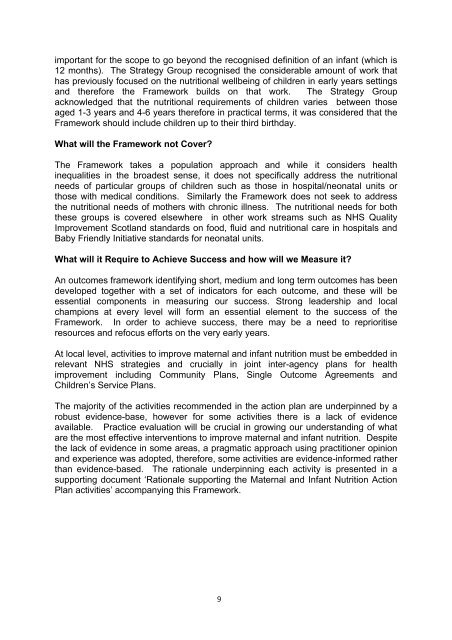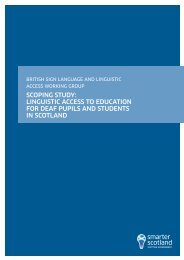Improving Maternal and Infant Nutrition: A Framework for Action
Improving Maternal and Infant Nutrition: A Framework for Action
Improving Maternal and Infant Nutrition: A Framework for Action
You also want an ePaper? Increase the reach of your titles
YUMPU automatically turns print PDFs into web optimized ePapers that Google loves.
important <strong>for</strong> the scope to go beyond the recognised definition of an infant (which is12 months). The Strategy Group recognised the considerable amount of work thathas previously focused on the nutritional wellbeing of children in early years settings<strong>and</strong> there<strong>for</strong>e the <strong>Framework</strong> builds on that work. The Strategy Groupacknowledged that the nutritional requirements of children varies between thoseaged 1-3 years <strong>and</strong> 4-6 years there<strong>for</strong>e in practical terms, it was considered that the<strong>Framework</strong> should include children up to their third birthday.What will the <strong>Framework</strong> not Cover?The <strong>Framework</strong> takes a population approach <strong>and</strong> while it considers healthinequalities in the broadest sense, it does not specifically address the nutritionalneeds of particular groups of children such as those in hospital/neonatal units orthose with medical conditions. Similarly the <strong>Framework</strong> does not seek to addressthe nutritional needs of mothers with chronic illness. The nutritional needs <strong>for</strong> boththese groups is covered elsewhere in other work streams such as NHS QualityImprovement Scotl<strong>and</strong> st<strong>and</strong>ards on food, fluid <strong>and</strong> nutritional care in hospitals <strong>and</strong>Baby Friendly Initiative st<strong>and</strong>ards <strong>for</strong> neonatal units.What will it Require to Achieve Success <strong>and</strong> how will we Measure it?An outcomes framework identifying short, medium <strong>and</strong> long term outcomes has beendeveloped together with a set of indicators <strong>for</strong> each outcome, <strong>and</strong> these will beessential components in measuring our success. Strong leadership <strong>and</strong> localchampions at every level will <strong>for</strong>m an essential element to the success of the<strong>Framework</strong>. In order to achieve success, there may be a need to reprioritiseresources <strong>and</strong> refocus ef<strong>for</strong>ts on the very early years.At local level, activities to improve maternal <strong>and</strong> infant nutrition must be embedded inrelevant NHS strategies <strong>and</strong> crucially in joint inter-agency plans <strong>for</strong> healthimprovement including Community Plans, Single Outcome Agreements <strong>and</strong>Children’s Service Plans.The majority of the activities recommended in the action plan are underpinned by arobust evidence-base, however <strong>for</strong> some activities there is a lack of evidenceavailable. Practice evaluation will be crucial in growing our underst<strong>and</strong>ing of whatare the most effective interventions to improve maternal <strong>and</strong> infant nutrition. Despitethe lack of evidence in some areas, a pragmatic approach using practitioner opinion<strong>and</strong> experience was adopted, there<strong>for</strong>e, some activities are evidence-in<strong>for</strong>med ratherthan evidence-based. The rationale underpinning each activity is presented in asupporting document ‘Rationale supporting the <strong>Maternal</strong> <strong>and</strong> <strong>Infant</strong> <strong>Nutrition</strong> <strong>Action</strong>Plan activities’ accompanying this <strong>Framework</strong>.
















